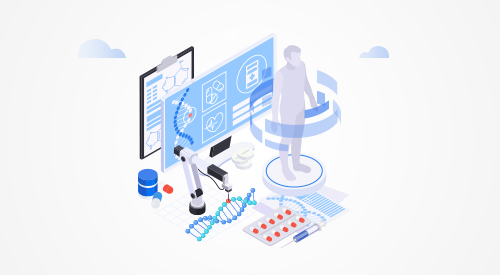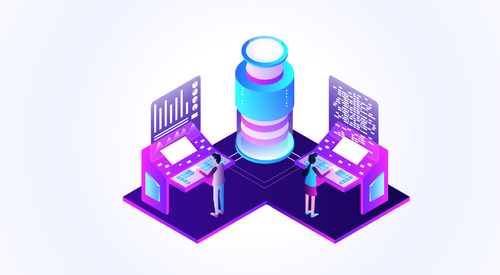

Imagine a world where medical imaging is decoded with unprecedented precision, where treatment plans are tailored to an individual’s genetic makeup, and where the complexities of drug discovery are unraveled with remarkable efficiency. Welcome to the realm of GenAI, or Generative AI in healthcare, where the fusion of artificial intelligence and healthcare is yielding groundbreaking possibilities.
Dive into the World of GenAI and Personalized Healthcare Strategies.
GenAI is not just about algorithms and data; it’s about transforming the healthcare experience for patients and practitioners alike. The innovation promises to revolutionize healthcare by harnessing the power of machine learning to derive insights, make predictions, and enhance decision-making in ways previously thought impossible. From navigating the ethical minefield to overcoming technical obstacles, here we will shed light on the intricacies of integrating GenAI into the fabric of healthcare.
Current State of Generative AI in Healthcare
The introduction of Generative AI in healthcare has already begun to yield remarkable outcomes, pushing the boundaries of what’s possible in patient care, research, and medical innovation. Let’s take a glimpse into the current state of GenAI’s applications within the healthcare domain and witness the transformation it’s facilitating.
Advancements and Successes
Medical Imaging Analysis: GenAI is transforming medical imaging for unparalleled accuracy and efficiency. Radiologists are benefitting from AI-powered algorithms that swiftly and precisely detect anomalies in X-rays, MRIs, and CT scans. These algorithms can identify patterns that might escape the human eye, leading to earlier diagnosis and intervention.
Drug Discovery: The pharmaceutical industry is experiencing a seismic shift thanks to GenAI. Machine learning models analyze vast datasets to predict potential drug candidates, optimize molecular structures, and even simulate drug interactions with greater speed and accuracy. This has the potential to dramatically accelerate the drug discovery process, saving time and resources.
Personalized Treatment Planning: The days of one-size-fits-all treatment plans are waning, thanks to GenAI’s ability to analyze individual patient data and genetic information. Treatment strategies can now be tailored to a person’s unique biological makeup, increasing the chances of successful outcomes and minimizing adverse effects.
Disease Diagnosis: GenAI’s prowess extends to diagnosing diseases, both common and rare. By analyzing a patient’s medical history, symptoms, and genetic information, AI systems can offer insights that aid physicians in making more accurate diagnoses. This is particularly valuable in cases where symptoms are ambiguous or the disease is uncommon.
Virtual Health Assistants: AI-driven virtual health assistants are becoming valuable tools in healthcare, offering patients 24/7 access to medical advice, symptom assessment, and even mental health support. These virtual assistants can help alleviate the strain on healthcare systems and provide timely assistance to patients.
Research and Insights: GenAI is sifting through mountains of medical literature, extracting key insights, and identifying correlations that human researchers might miss. This aids in advancing medical research and ensuring that healthcare professionals have access to the latest findings and treatment options.
Surgical Precision: Surgeons are embracing GenAI to enhance their precision and decision-making during procedures. AI models can provide real-time guidance, flag potential complications, and simulate surgical scenarios for preoperative planning.
Mental Health Support: The field of mental health is also benefiting from GenAI. Algorithms can analyze speech patterns, facial expressions, and text to gauge an individual’s mental state, potentially offering earlier intervention and personalized treatment plans.
Challenges in Adopting GenAI in Healthcare
Data Quality and Quantity: Fueling GenAI’s Potential in Healthcare
Behind the scenes of the extraordinary capabilities of Generative AI in healthcare lies a critical factor that fuels its success: data. The quality and quantity of medical data play a pivotal role in training AI models to perform with accuracy and reliability. However, this foundation is not without its challenges. In this segment, we delve into the significance of high-quality and diverse medical data, while also addressing the hurdles that arise due to privacy concerns and regulations.
Importance of High-Quality and Diverse Medical Data
GenAI’s ability to make intelligent decisions hinges on the data it is exposed to during its training phase. High-quality data ensures that the AI model learns from accurate information, leading to dependable outcomes in real-world applications. Diverse data, encompassing various demographics, medical conditions, and scenarios, allows the AI model to generalize its learning and make robust predictions across a wide spectrum of cases.
In medical imaging, for instance, a diverse dataset of X-rays, MRIs, and CT scans helps AI models recognize patterns associated with different conditions, enabling accurate identification of anomalies. In drug discovery, a well-curated dataset of molecular structures and their interactions informs AI models about potential drug candidates and their properties.
Challenges of Accessing and Sharing Patient Data
While high-quality and diverse data are essential, they often come from sensitive sources—patient records containing confidential medical information. The challenge arises in obtaining access to such data due to stringent privacy regulations and ethical considerations. Patient data must be safeguarded to prevent misuse and breaches of privacy.
Regulations like HIPAA (Health Insurance Portability and Accountability Act) in the United States and GDPR (General Data Protection Regulation) in the European Union mandate stringent controls over how patient data is collected, stored, and used. Healthcare institutions need to navigate these regulations while ensuring that patient privacy is upheld. This creates a delicate balance between utilizing valuable data for GenAI training and respecting patients’ rights to confidentiality.
Finding a Middle Ground: Synthetic Data and Collaboration
To address these challenges, researchers are exploring the use of synthetic data—artificially generated data that mirrors real-world patterns without compromising patient privacy. Synthetic data can help train AI models without exposing actual patient information, enabling researchers to navigate data access restrictions more effectively.
Moreover, collaborative efforts between healthcare institutions, AI developers, and regulatory bodies can lead to the establishment of data-sharing frameworks that adhere to privacy regulations while promoting medical advancements. By fostering a culture of responsible data stewardship and collaboration, we can unlock the potential of GenAI while maintaining the highest standards of patient privacy.
With Generative AI in healthcare, the boundaries of possibility are constantly expanding. By harnessing AI’s analytical prowess, tailoring treatments to individual needs, fostering collaboration between technology and human expertise, and committing to relentless research and innovation, we are shaping a future where healthcare transcends its current limitations and becomes a beacon of precision, compassion, and effectiveness.











